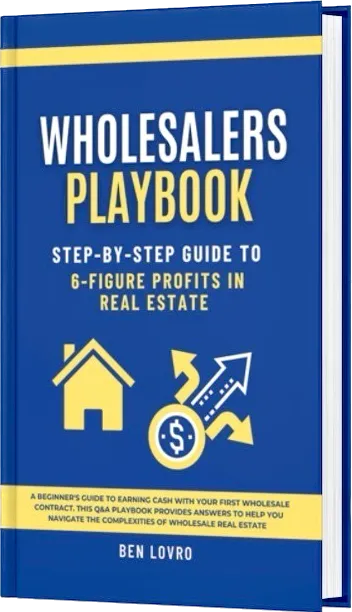Investor Syndicate Blogs
Download The Deal Flipping Playbook

How to Protect Yourself When Real Estate Investments Fail
Introduction
Real estate investments can be an excellent way to grow your wealth, but they also come with risks. Sometimes, despite careful planning and research, these investments can fail to yield the expected returns. When that happens, it's essential to know how to protect yourself and minimize potential losses. In this guide, we'll explore various strategies to safeguard your interests in case your real estate investments don't go as planned.
Understanding the Risks
Before delving into protection strategies, it's crucial to understand the risks associated with real estate investments. Real estate markets can be volatile, affected by economic conditions, market trends, and unforeseen events. Some common risks include property depreciation, extended vacancies, unexpected maintenance costs, and financing challenges.
Diversify Your Portfolio
Diversifying your portfolio is a smart strategy to protect your investments. Imagine your investments are like different types of candy in a jar. If you have only one type of candy and it starts to melt, you might lose all your candy. But if you have many different types of candy, even if one melts, you still have plenty left to enjoy.
In the world of real estate, diversifying means spreading your investments across different properties or locations. This way, if one property doesn't do well, your other investments can make up for it. It's like having a backup plan.
For example, you might invest in apartments in one area and houses in another. If the apartment market slows down, your houses can still bring in income. Diversification helps you reduce the risk of losing money if one investment doesn't work out as expected. It's like having a safety net for your financial future.
Build a Financial Cushion
Building a financial cushion is like creating a safety net for your real estate investments. It's all about setting aside some extra money to cover unexpected expenses that might pop up. Imagine if your rental property suddenly needed expensive repairs or if you couldn't find tenants for a while, and you still had to pay the mortgage. That's where your financial cushion comes in handy.
By putting some money aside in an emergency fund, you ensure that you won't have to dip into your personal savings or struggle to make ends meet when tough times hit. This financial cushion is your backup plan, giving you peace of mind and helping you weather any storms that may come your way in the world of real estate investing. So, whether it's a leaky roof or a sudden drop in property value, you'll be ready to handle it without breaking a sweat.
Stay Informed
Staying informed is like having a superpower in the world of real estate investments. It means keeping your eyes and ears open to what's happening around your property. Here's why it's important:
Imagine you own a house in a neighborhood, and suddenly, a big company announces they'll be building a new office complex nearby. That could make your property more valuable! But if you didn't know about it, you might miss out on the opportunity to sell or rent your property for a higher price.
That's why you need to stay informed. Keep an eye on your property's neighborhood.
Read news about the area, and talk to people who live there. If you notice any changes or developments, like new businesses, schools, or parks being built, it could affect your property's value. So, staying informed helps you make smart decisions and protect your real estate investments.
Leverage Professional Advice
Real estate investments can be complex, and seeking professional advice is a wise move. Consider working with a financial advisor, real estate attorney, or experienced property manager who can provide guidance on investment strategies, legal matters, and property management. Their expertise can help you navigate challenges and make informed decisions. Here are some professionals you might want to talk to:
Financial Advisors: They can help you make a plan to deal with financial issues related to your investments.
Real Estate Attorneys: These lawyers specialize in real estate laws. They can help you with legal matters and protect your interests.
Property Managers: If you own rental properties, property managers can handle the day-to-day tasks, making your life easier.
Review Your Financing Options
If you encounter financing difficulties with your real estate investments, explore alternative financing options. Refinancing, loan modification, or seeking out private investors are potential solutions to address cash flow problems. It's crucial to be proactive and explore these options before financial issues escalate. Here are a few financing options to consider:
Refinancing: This means replacing your current mortgage with a new one, often with better terms. It can lower your monthly payments and give you more financial flexibility.
Loan Modification: Your lender may be willing to adjust the terms of your loan to make it more manageable, like extending the loan term or reducing the interest rate.
Private Investors: Sometimes, private individuals or groups may be interested in investing in your property or helping you with financing.
Evaluate Your Exit Strategy
Evaluating your exit strategy is a crucial step when it comes to real estate investments. Think of an exit strategy as a backup plan for when things don't go as expected. It involves deciding when and how to sell a property that's not performing well.
Here's the deal: if a property isn't making the money you hoped for or if the market is heading south, you might want to sell it before things get worse. That's where your exit strategy comes in handy.
You need to keep an eye on the market conditions and the property's value. If you see signs that the property's value is dropping, it might be a good time to sell. By selling at the right time, you can minimize your losses and protect your investment.
So, remember to have a solid exit strategy in place and keep a close watch on the market. It's like having a safety net for your real estate investments!
Legal Protections
Legal protections are like safety shields that can safeguard your real estate investments. Imagine you have a contract with someone to buy or sell a property. If that person doesn't stick to the deal or tries to take advantage of you, legal protections can come to your rescue.
Working with a knowledgeable attorney is a smart move. They can create contracts and agreements that are strong and clear. These legal documents spell out the rules of the game, ensuring everyone plays fair. If problems arise, you can turn to these contracts for help.
For example, if someone refuses to sell you a property after agreeing to it, you can take legal action to enforce the deal. Or if you're facing disputes over property ownership, a well-crafted contract can provide a solid foundation for your case.
So, remember, legal protections are your allies in the world of real estate. They ensure that your investments are backed by the law, giving you peace of mind and recourse if things go wrong.
Conclusion
While real estate investments offer substantial potential rewards, they also come with inherent risks. By following these strategies and staying vigilant, you can protect yourself when real estate investments don't go as planned. Remember that seeking professional advice and diversifying your portfolio are powerful tools in your arsenal to safeguard your financial interests.
Contact Us

Bet On Yourself
Empowering real estate investors with the tools they need to scale.






